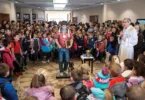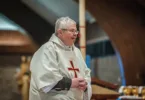
by Therese Horvat
Special to The Leaven
Last fall, a Pew Research Center report projected that if current trends continue, the percentage of Christians in the United States will decline quite a bit — or perhaps drastically — by 2070. The decline is not because of more people embracing other faiths.
Rather, Americans — and in particular 15- to 29-year-olds — are detaching themselves from any faith affiliation at all.
Pew admits that this is a bit of a snapshot of the Ghost of Christmas Yet to Come. Things may not unfold exactly as projected, or events outside the scope of the Pew study could trigger a revival of Christianity.
The Leaven reached out to six individuals — priests, religious and laity, serving different constituencies — for reactions to this report. Here is what we found.
Changing religious landscape: ‘nones’ to outpace Christians
In “Modeling the Future of Religion in America,” Pew notes that since the 1990s, large numbers of Americans have left Christianity to join growing ranks of U.S. adults who describe their religious identity as atheist, agnostic or nothing in particular. Trends indicate that the unaffiliated/disaffiliated, also known as religious “nones,” are outpacing the number of persons who identify as Christians. If current trends accelerate, Christianity could become a minority religion in the United States by 2070.

“Switching” religious identity from Christian to “not affiliated with any religion” is a relatively new phenomenon. In the early 1990s, 90% of U.S. adults said they were Christian. Pew estimated that in 2020, 64% of Americans, including children, were Christian; 30%, unaffiliated or “nones”; and 6%, other religions. Of note from the Pew report:
• There has been a steady shrinking share of young adults raised Christian in childhood who have retained their religious identity over the past 30 years.
• Among persons born in the 1940s, 1950s and 1960s, there has been more substantial movement away from Christianity after age 30. Switching identity from Christian to disaffiliated has been extending to more age groups.
• As progressively fewer adults retain their childhood Christian identity, fewer parents are raising children in Christian households.
• A declining percentage of people raised without a religion have converted or taken on a religion later in life.
• The pace of disaffiliation increased continuously between 2010 and 2020.
• Americans give a wide range of reasons for leaving religion behind.
Pew modeled four main hypothetical scenarios based on these trends depicting how the religious landscape might change over the next 50 years. Whether switching from Christian to disaffiliated identity continues at recent rates, speeds up or stops entirely, projections from the trend analysis show that Christians of all ages will shrink from 64% to between 54% and 35% of all Americans by 2070. The “nones” will rise from 30% to between 34% and 52% of the U.S. population (page 24, Pew report).
While not within the scope of the study, Pew researchers write that a religious revival is possible. Religious, social, economic and other types of upheaval (e.g., wars, natural disasters, etc.) have shifted trends in the past.
Reactions to Pew report
None of the individuals interviewed by The Leaven about the Pew report was surprised by the projections. Father Matthew Nagle, director of the Didde Catholic Campus Center at Emporia State University and pastor of St. Mary Parish, Hartford, had this to say.
“We’ve been talking about the rise of the ‘nones’ for a decade,” he said. “I think the [projections of the] trends are realistic and that they will continue.”

Michael Sanem, minister of evangelization at Church of the Nativity in Leawood, recalls an earlier study that examines why 18- to 25-year-olds are leaving the Catholic Church. This report describes disaffiliation as a thoughtful, conscious, intentional choice made by young people in a secularized society where faith and religious practices are seen as one option among many (“Going, Going, Gone: The Dynamics of Disaffiliation in Young Catholics,” Saint Mary’s Press of Minnesota, Inc., in collaboration with the Center for Applied Research in the Apostolate (CARA), September 2017).
“Disaffiliation is the reality we need to face, and it’s not a comfortable one,” said Sanem. “What’s important is that churches ask what they are going to do with the data. Maintaining the status quo doesn’t appear to be perpetuating generations of Christians.”
While he agrees that disaffiliation trends are occurring, Father Peter Jaramillo, SSA, has experienced a different dynamic among the Spanish-speaking people he serves. Father Peter is pastor of St. Mary-St. Anthony Parish and All Saints Parish in Kansas City, Kansas. In his Hispanic ministry apostolate, he has seen a renewal of spirituality through small group faith communities.
“For many of these people, the church is everything,” he explained. “Immigrants coming to the United States are looking for common ground. They are more at risk with housing and life transitions. They grab onto their faith, try to practice it and try to get their lives squared away.”
Why Christians are disaffiliating
Sister Susan Wood, SCL, theologian and professor of systematic theology at Regis College, Toronto School of Theology at the University of Toronto, cites growing secularization as a leading cause of disaffiliation from organized Christian religions. The breakdown of marriage and family life is another major contributing factor.
Whereas families traditionally handed down their religion to the next generation, breaking this tradition through divorce or interreligious marriages often changes the outcome. The temporary discontinuation of in-person liturgies at the height of the COVID pandemic also has churches asking what it will take to bring people back.
Father Jaime Zarse — pastor of parishes including Sacred Heart, Sabetha; St. Augustine, Fidelity; and St. James, Wetmore; and coordinator of the archdiocesan Totus Tuus program — names two related reasons behind the growing disaffiliation with Christianity.

Father Zarse perceives the breakdown of marriage and family as pivotal to producing a generation of young adults who are lonely, depressed and fearful. Additionally, faith does not seem as relevant to people today. Across ministries he’s served, Father Zarse has noticed that “despite coming to Mass, there’s a disconnect between what happens in the parish and the rest of a person’s life.
“Faith can’t compete with professional or kids sports, for example.”
Msgr. Stuart Swetland — theologian, president of Donnelly College and pastor of Our Lady & St. Rose Parish in Kansas City, Kansas — identifies a combination of missteps by organized religion that have made it more difficult for young people to understand the faith. This includes church scandals and a less than satisfactory job of forming younger generations of believers.
“Young adults don’t know their own faith or that of others,” he said. “You can’t love what you don’t know.”

Add to this, younger people’s dissatisfaction with church involvement in politics and political issues, and the general decline in society of people joining anything — organizations, religious denominations and clubs.
Father Nagle, an alum of a large state university, thought he had a good understanding of life and religion on a secular campus. He’s learned, however, that the challenges are more intense than he anticipated. Students striving to practice their faith and live counterculturally feel isolated.
Sanem wonders whether the cultural upheaval experienced by younger generations in their formative years could accelerate trends associated with disaffiliating from Christian denominations. He cites another study reporting that 46% of adults under 35 feel stressed to the point of not being able to function.
“How do our parish communities become ‘field hospitals’ for people going through crises?” he asked.
To the above reasons, the Pew report adds:
• As societal conditions have improved and scientific advances allowed people to live longer, there’s less need for religion to help people cope with insecurities.
• There is declining trust in religious institutions.
• Families are having fewer children.
The church and the modern world
This growing disaffiliation from Christianity prompts the question whether the church — and specifically, the Catholic Church — is out of step with the modern world.
It appears that some social trends — for example, cohabitation before marriage, a higher divorce rate, greater numbers of persons choosing not to marry at all (despite their parental status) and the gradual move away from organized religion — might be irreversible. Many of these trends run counter to teachings of the Catholic Church.

While those interviewed agreed the church should not water down the truths of the faith to increase appeal, several advocated for pastoral, charitable and creative approaches to presenting the faith.
When Father Nagle meets with a couple during marriage preparation who may have drifted from the practice of the faith, he uses this as an opportunity to evangelize. He gets to know the couple.
“I try to convince them of the importance of practicing the faith,” he said. “Part of that may entail a hard conversation about cohabitation — that it’s spiritually harmful and that sociological evidence shows that couples who cohabitate before marriage are more likely to divorce than those who don’t cohabitate.”
“We always want to be more attentive, as understanding and sensitive as we can,” believes Father Peter. He encourages a return to the basics: offering the sacraments, affirming the community of the faithful, celebrating with great joy and renewing sacrificial love at all levels.
“We are most happy when we make sacrifices out of love,” he said.
Sister Susan believes the church needs to accept the person even if it does not accept his or her stance on a trend or an issue. She points to Pope Francis, who invites believers to accompany people who are in a middle space between cultural expectations and ecclesiastical expectations.

“Work with people on ways to be the best persons they can be in situations of moral tension,” she said. “Help them in their discernment; work creatively to enhance their relationship with God; witness to them. The Holy Spirit does the rest.”
In the final analysis, Father Nagle believes that Jesus’ teachings were out of step with the world and countercultural to his time. He lived and witnessed the truths he taught and invited his followers — then and now — to be missionary disciples.
Relationships foundational to faith
Sanem considers the Pew and similar reports as wake-up calls that can open doors to Spirit-led evangelization opportunities.
Among these, Msgr. Swetland suggests that ministries help persons attending church go deeper in their relationship with Jesus. For those not attending, he recommends personal friendships, genuine caring and good conversation as foundational to introducing people to the Lord.
“Any ministry that is going to work has to be relational,” he said, and proposed that the clergy empower and form the laity for this important role.

Father Zarse values investing in marriage and family life as critical to faith formation. He agrees that the church needs to help people feel like they belong.
“They have to feel they belong before they believe,” he said.
The parishes Father Zarse pastors in rural Kansas have adopted programs and initiatives directed toward these goals. These include “Communio,” focused on marriage and relationship ministry, and “Amazing Parish,” designed to improve the organizational health of parishes and transform them into vibrant mission communities.
At Sacred Heart, Sabetha, renovation of the parish hall created a comfortable setting for small group sessions.
“The Holy Spirit has convinced me that we need to go on the offensive — creating beautiful spaces; offering marriage enrichment opportunities; connecting through small groups; and engaging every demographic group in the parish,” said Father Zarse. “The parish is experiencing a ‘springtime’ in its history with increased involvement in relationship-building, hospitality, religious education and vocation discernment.”

Sanem advocates that a pastoral concern should characterize all encounters, whether walking parishioners through the death of a loved one or a divorce. Msgr. Swetland urges, “In a joyful and peaceful way, radiate the peace of Christ. We have to live the truth joyfully to the fullest.”
What if Christianity becomes a minority religion?
If Christianity becomes a minority religion in 20 or 50 years, what difference does this make?
“If we’re a little church, it’s OK,” said Sanem, “as long as we’re a little church that’s listening, accompanying and evangelizing. If we are obsessed with numbers, we need to ask if we are living the tradition of Christianity.”
He has a growing sense, he said, that this is a graced time and that being a minority frees Christians to be more countercultural.
“Being a minority is not always a bad thing,” agreed Father Peter. He points to Jesus, who said that the road to salvation is narrow and that it requires willingness to be humble to find the path.
“Numbers are important,” he added, “but more important is the quality and the character of our faith; it needs to remain steadfast.”

Father Nagle also sees an opportunity afforded by Christianity becoming a minority religion.
“We can shift out of the maintenance mode and emphasize the apostolic mode and evangelizing,” he said.
Finding hope
Father Nagle finds that the young people he serves are hungry for truth, meaning, purpose and community; they also respond to something that challenges them. While adhering to divine revelation and doctrines of faith, he urges the church to be creative in teaching and preaching and flexible in ways of preparing and bringing people into the church.
He cites an engaging book club discussion hosted at the campus center around Dante’s “Divine Comedy.” If he had announced plans to teach a course on heaven, hell, purgatory, virtue and vice, the campus minister doubts it would have been as well-received as delving into perspectives of the medieval poet.
“The younger generation is a generation of goodwill,” maintains Msgr. Swetland. “I’m constantly amazed at their good-heartedness, kindness and compassion — all something to build upon.” But young people need an intentional and focused ministry — one that will go deeper and present the riches of the faith to them.

Father Zarse finds hope in heroic leaders, including popes, bishops, priests, and parish leaders and teams who have agreed to be unapologetically Catholic and to do this with great joy.
Pope Francis is a good example of a leader who exudes a culture of dialogue, witness and commitment, said Sister Susan.
“We are being called to return to the work of the early church,” she explained. “Our focus should be on our relationship with Jesus Christ and how this informs our lives. In terms of church, we need to ask what is the nature of the community that surrounds and supports this proclamation of the mission of Jesus. We need to think about church structures and doctrines through a pastoral lens.”
“I have a growing sense,” concluded Sanem, “that we are in a graced time: a new moment for a new evangelization.”







I read the article about the number of confessing Christians lessening over the last 10-15 years. Have to wonder if we try too hard to define what a Christian is in our time. Maybe we try too hard to define what a Christian should believe or how they should act to be called a Christian. As the article stated some of the people that claim they are not Christians do so because they do not want to deal or identify with some of the politics of the church be it Catholic or Protestant. I have to agree with Msgr Stuart all sinners have to be accepted in the Church. It is not our place to judge them, leave it to God. I remember a time my daughter visited a Sunday School class with her good friend only to hear the Sunday School teacher make the comment, people that have been divorced or had a baby out of wedlock were not wanted in their church. My daughter asked “Aren’t they the ones that really need the Church?” The teacher didn’t answer. So, if I understood Msgr Stuart correctly we have to be open.
I think creating small meeting rooms in a church or hall such as Sacred Heart in Sabetha did was a stroke of brilliance. I wish my Church could do the same. Small groups work, our Sunday School class consists of about 15-18 people, and we have become very close knit and most of us find this class just as important as Church.
Michael Sanem made a good point when he indicated that Christianity should be presented in a joyful, peaceful way to radiate the peace of Christ. We have to live the truth joyfully to the fullest. If people see our actions as Christians this way, they will respond.
Father Nagle stated that we shift out of the maintenance and emphasize apostolic mode. I have to ask; would that be done by preaching what Jesus was trying to teach us? Such as love, forgiveness, understanding and knowing the person or persons before we judge? If I understand that right, I agree 100 percent.
Maybe we need to learn to think outside the box? We have talked about it at my Church, does that mean we learn to meet outside the Church, do we meet in a restaurant for a night to meet other people in our Church, or learn to meet on another day? I don’t know, I am trying to think outside the box and sometimes I think the sides are too high or I don’t have enough imagination.
This article was great and very thought provoking about the dwindling number of professing Christians. I wonder if we don’t have more Christians than we realize but due to politics, rules, judgement etc., they don’t want to be affiliated with a church even though they might believe in a God. But, with so many denominations, rules, etc. one has to wonder. Who is right?